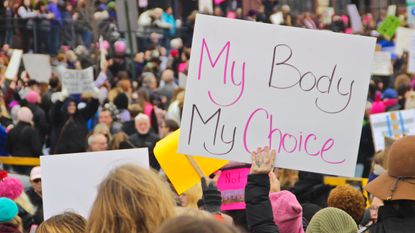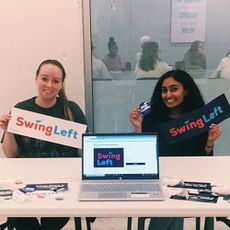

On September 1, 2021, Texas' near-total abortion ban, S.B. 8, went into effect. The most restrictive abortion law in the country bans abortion after six weeks of pregnancy (at six weeks, most people don't even know they are pregnant), does not make an exception for pregnancy that results from rape or incest, and allows private citizens to sue anybody who provides an abortion or assists someone in accessing an abortion after this time period. They will receive a $10,000 award if they are successful.
The law is the first of many that will likely be replicated in conservative states across the nation after the Supreme Court allowed the law to go into effect in a 5 to 4 vote. It also alludes to the Court's decision in the months ahead when it decides whether Roe v. Wade, the 1973 landmark decision that affirms access to a safe and legal abortion is a constitutional right, should be overturned.
Related Story

As Nancy Northup, president and CEO of the Center for Reproductive Rights, wrote for Marie Claire on the 48th anniversary of Roe v. Wade this past January, "Roe has been a critical bulwark against the hundreds of state abortion bans and restrictions enacted in the past decade...But the Supreme Court has changed composition since the June Medical decision, following the death of Justice Ruth Bader Ginsburg and the confirmation of Justice Amy Coney Barrett in her place. This capped a seismic shift in the federal courts during the Trump administration, with incredibly troubling implications for abortion."
People of color will suffer the most from Texas' restrictive law, along with many young people, immigrants, LGBTQ+ people, and those who live in rural areas who already have barriers to quality health care and face other forms of discrimination. Traveling across state lines to receive the procedure is simply not an option for many people.
With abortion top of mind for both citizens and lawmakers (2021 is the worst legislative year for abortion rights since Roe), misinformation continues to circulate about the procedure itself and related laws across the country, like whether taking Plan B is the same thing as getting an abortion (it's not) and whether or not abortion is still technically legal in all 50 states (it is). To clarify these questions, Marie Claire enlisted the expertise of Dr. Meera Shah, a family medicine physician who currently serves as the chief medical officer of Planned Parenthood Hudson Peconic, to debunk common abortion myths by creating a comprehensive guide on abortion, below.
Is abortion still legal in all 50 states?
Texas' law banning abortion after six weeks makes it pretty close to being illegal in the state, but, yes, abortion is technically still legal in all 50 states and in D.C. "It's unfortunate, but a lot of the headlines make that very simple question pretty confusing," says Dr. Shah. "I have to let my patients know that abortion is legal everywhere, despite what the headlines say and the attacks on abortion care at the moment."
The Guttmacher Institute, a pro-choice research organization founded in 1968, has a frequently updated legislative tracker where you can check to see what type of restrictions and bans your state has introduced. You can access it here.
Stay In The Know
Marie Claire email subscribers get intel on fashion and beauty trends, hot-off-the-press celebrity news, and more. Sign up here.
Is it still legal to get an abortion past the six-week mark?
Not in Texas due to the passage of S.B. 8, which went into effect on September 1. It's the most restrictive abortion law in the country.
"The reason why [lawmakers] picked six weeks is because this is usually the time at which there is some cardiac activity detected on ultrasound, but most people aren't even aware that they are pregnant at this time," explains Dr. Shah. "Often people discover that they're pregnant around seven to eight weeks. Essentially this bans the vast majority of abortions [in Texas]."
I want an abortion. How does the process work?
"It depends on where you live. In New York, if somebody discovers that they're pregnant and they decide that they don't want to continue with the pregnancy, they can call one of the many providers that are available who provide abortion care and make an appointment. Oftentimes, they're able to get an appointment that same day," says Dr. Shah. "Where I work at Planned Parenthood Hudson Peconic, we have 10 health centers that provide abortion care six days of the week. The pregnancy is dated and then either a medication abortion is provided or a procedural abortion is scheduled. There's no waiting period, no mandatory script that has to be read. In some states, a script has to be read that's filled with lies that say things like 'abortion can cause breast cancer, abortion can cause depression.' It's not true."
Though the cost of an abortion widely varies, you can learn more about the potential cost here and here.
What are some barriers to accessing abortion?
"In some states, like Texas, there's a 24-hour waiting period where the patient has to go home [after getting the ultrasound] and return at least 24 hours later to get the abortion. In Indiana, it's 18 hours. In Missouri, it's 72 hours. In North Carolina, it's 72 hours as well," says Dr. Shah, noting this disproportionately affects people of color the most. "There are these arbitrary amounts of time where patients have to go home and return, which means that they have to take time off work, find transportation, and arrange childcare all to fulfill the requirements that are in place to restrict abortion access."
Dr. Shah continues, "These rules do nothing to 'change people's minds' as they're intended to. What they really end up doing is cause harm and distress. They cause people to have to pay more out of pocket to try and access care. In some states they don't even allow commercial insurances to pay for abortion care. So people are paying out of pocket essentially. Because of the Hyde Amendment, Medicaid can't be used to pay for abortion care."
The Biden administration recently announced it will remove the Hyde amendment from the proposed budget for the 2022 fiscal year.
How do I decide whether to receive a medication abortion or a procedural abortion?
"The vast majority of abortions occur early in pregnancy in the first trimester. We know that medication abortion is safe and effective up to 11 weeks. So if somebody is less than 11 weeks [pregnant], they can choose to have a medication abortion or they can choose to have a procedural abortion," explains Dr. Shah. "But because of all of these bans, what [lawmakers] do is they oftentimes push people into a later gestational age, thus forcing them to only have the option of a procedural abortion. It's a great and safe method, but some people would rather take a pill as opposed to having a procedure. We want to ensure that people are still able to make those choices."
If I choose to receive a medication abortion, can my abortion provider mail me pills or do I have to pick them up in person?
"Historically, the [abortion] provider has to dispense the pills from the health center, meaning a patient has to come to the health center to get the pill. Now, what is allowed is that a provider can mail the pill or send the prescription to a mail-order pharmacy to have it shipped to the patient if they qualify based on their gestational age that they report," says Dr. Shah. This is based on Food and Drug Administration (FDA) rules.
Related Story

"The FDA has restrictions on the pill mifepristone. [At the beginning of] COVID-19, patients were being told that they should stay at home, shelter in place, and socially distance, yet they were also being told they can have telehealth for any health care needs, but for abortion you have to come in to get the pills," explains Dr. Shah. "There was this pause in the rule where patients were mandated to come in. Now it's back in place. Still, it's not an option for everyone everywhere because of state rules. So the FDA can say one thing, but then each state has the right to implement unnecessary barriers."
Will an IUD cause me to have an abortion if I get pregnant?
"No. An IUD is one of the most effective methods of contraception that we have. It prevents pregnancy before it even occurs," says Dr. Shah. "We see this a lot where politicians will say that IUDs or emergency contraception cause abortion, and that's just not how it works. It's not even medically possible."
Is Plan B the same as medication abortion?
"No. There are two different emergency contraceptive pills: One is Ella. One is Plan B. One is progesterone, one is a progesterone blocker," says Dr. Shah. "They prevent pregnancy by delaying ovulation. It does not cause an abortion. It's two totally different pharmacological mechanisms."
If you're already pregnant, Plan B won't affect the pregnancy either in the event that you were pregnant and didn't know.
How old do I have to be to get an abortion?
"That depends on the state you live in. In many states, minors have to have parental or guardian consent in order to get an abortion and if this isn't possible, then some states will allow judicial bypass, where the young person can go to court and have the court grant them the ability to get an abortion without parental or guardian consent," says Dr. Shah. "Interestingly, in these same states, if the individual wanted to continue the pregnancy, they do not have to have parental or guardian consent. They can continue a pregnancy and become a parent."
FIND MY STATE'S ABORTION AGE REQUIREMENTS
Can I go by myself to get an abortion or does someone have to come with me?
"That depends on your age. If you live in a state where you have to have consent from a parent or guardian, then you would need to bring somebody with you who can sign the paperwork," explains Dr. Shah. "If you're getting a procedural abortion and want sedation to help make the procedure more comfortable, you may be asked to bring someone with you who [can provide support] and drive you home afterward as well."
How do I find the closest abortion clinic near me?
You can utilize Power to Decide's abortion finder tool, which includes more than 750 verified abortion service clinics across the country and a list of state laws that might limit a person's access to abortion care.
FIND AN ABORTION CLINIC NEAR ME
Do transgender folks need to disclose that they are trans before getting an abortion?
"No. The only thing that we ask when seeing patients for abortion care are things that are medically relevant," says Dr. Shah. "At Planned Parenthood, we ask patients their pronouns because we want them to feel seen. It's a way for us to honor them and honor their identity and let them know that it's a safe place to get care. If they're pregnant and they don't want to be, the care is the same. The fact that they're trans or non-binary doesn't need to be disclosed if it's not medically relevant."
How can I fight against abortion restrictions both at the federal and state level?
You can learn more about federal and state restrictions on abortion here. The best way to fight against these restrictions are to take the following actions:
- Vote for pro-choice politicians up and down the ballot.
- Sign the petition against S.B. 8: Text SB8 to 22422 or click here.
- Follow organizations who are actively fighting for abortion rights like the ACLU, Planned Parenthood Action, NARAL, Whole Woman's Health Alliance, Power to Decide, the National Abortion Federation, and the Center for Reproductive Rights.
- Donate to abortion funds like the National Network of Abortion Funds, Indigenous Women Rising, and the Lilith Fund that provide assistance to people who want to receive an abortion but may not be able to afford it.
Related Stories


Rachel Epstein is a writer, editor, and content strategist based in New York City. Most recently, she was the Managing Editor at Coveteur, where she oversaw the site’s day-to-day editorial operations. Previously, she was an editor at Marie Claire, where she wrote and edited culture, politics, and lifestyle stories ranging from op-eds to profiles to ambitious packages. She also launched and managed the site’s virtual book club, #ReadWithMC. Offline, she’s likely watching a Heat game or finding a new coffee shop.
-
 Luke Bryan Trips Over a Fan's Phone During a Show, Jokes "My Lawyer Will Be Calling"
Luke Bryan Trips Over a Fan's Phone During a Show, Jokes "My Lawyer Will Be Calling"He thought it was hilarious.
By Iris Goldsztajn Published
-
 Melissa McCarthy Defends Meghan Markle From Critics Who Are "Threatened" by Her
Melissa McCarthy Defends Meghan Markle From Critics Who Are "Threatened" by HerMcCarthy once starred in the duchess' 40th birthday video.
By Iris Goldsztajn Published
-
 Zendaya Says She Might Just "Go Away for a While" During 'Euphoria' Hiatus
Zendaya Says She Might Just "Go Away for a While" During 'Euphoria' HiatusRest is best!
By Iris Goldsztajn Published
-
 What's the Holdup in Biden's Push for Paid Leave?
What's the Holdup in Biden's Push for Paid Leave?The president is proposing $325 billion to fund paid family leave—the strongest budget proposal in history—and pushing for free universal pre-K nationwide. But he faces opposition.
By Dawn Huckelbridge Published
-
 36 Ways Women Still Aren't Equal to Men
36 Ways Women Still Aren't Equal to MenIt's just one of the many ways women still aren't equal to men.
By Brooke Knappenberger Last updated
-
 What's at Stake in the 2022 Midterm Elections
What's at Stake in the 2022 Midterm ElectionsWith abortion rights, democracy, and many more critical issues on the ballot, there’s no room for apathy this election cycle.
By Rachel Epstein Published
-
 The 2022 Midterm Elections: What to Know Ahead of Election Day
The 2022 Midterm Elections: What to Know Ahead of Election DayConsider this your guide to key races, important dates, and more.
By Rachel Epstein Published
-
 4 Ways Your Rights Are on the Ballot This Election
4 Ways Your Rights Are on the Ballot This ElectionAccording to Vice President Kamala Harris.
By Emily Tisch Sussman Published
-
 Moms Will Make the Difference in the Midterm Elections
Moms Will Make the Difference in the Midterm ElectionsA plethora of issues impacting women and children will be top of mind for moms as they head to the polls this November.
By Emily Tisch Sussman Last updated
-
 How New York's First Female Governor Plans to Fight for Women If Reelected
How New York's First Female Governor Plans to Fight for Women If ReelectedKathy Hochul twice came to power because men resigned amid sexual harassment scandals. Here, how she's leading differently.
By Emily Tisch Sussman Last updated
-
 Why the 2022 Midterm Elections Are So Critical
Why the 2022 Midterm Elections Are So CriticalAs we blaze through a highly charged midterm election season, Swing Left Executive Director Yasmin Radjy highlights rising stars who are fighting for women’s rights.
By Tanya Benedicto Klich Published